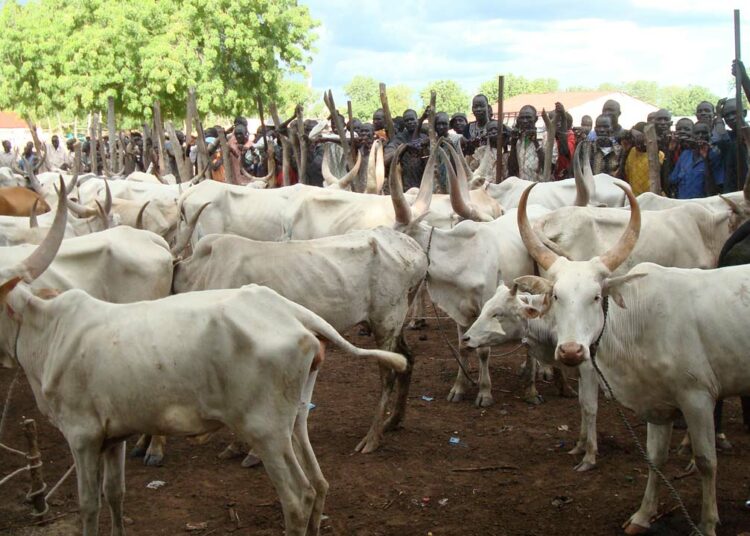The Coalition of Pastoralist Associations in Nigeria (COPA) has issued a warning regarding efforts by some legislators to disrupt the establishment of a Ministry of Livestock Development, which President Bola Ahmed Tinubu recently approved.
In a statement, COPA’s Secretary General, Dr. Salim Musa Umar, expressed concern over clandestine actions taken by vested interests driven by divisive motives aimed at thwarting the ministry’s creation.
“We are aware of several meetings involving critical legislators in the National Assembly that oppose the establishment of the Ministry of Livestock Development for their selfish interests,” Dr Umar stated.
“Reliable sources revealed that these meetings aimed to recruit individuals to engage in violent acts against farms, planning to later attribute these assaults to pastoralists within their communities.
“It is disturbing to learn that the poisoning of vital water sources is being contemplated, which could have devastating consequences for livestock. This calculated destruction appears designed to generate chaos and unrest, providing justification for a senator to propose urgent legislation that capitalises on the manufactured crisis, ultimately jeopardising the push for the Ministry of Livestock Development,” he elaborated.
COPA strongly condemns these unscrupulous tactics and calls for immediate action to thwart this potential conspiracy.
“We urge all stakeholders—government officials, civil society, and the general public—to recognise and condemn such divisive strategies that destabilise pastoralist communities and undermine agricultural development in Nigeria,” Dr Umar continued.
“It is essential that we work collectively to protect the interests of all stakeholders in the agricultural sector and prevent the escalation of violence fueled by deceitful political manoeuvres. We call on authorities to investigate these alarming revelations and hold accountable those who seek to perpetuate conflicts for political gain.”
It is worth recalling that President Bola Tinubu announced the formation of the Federal Ministry of Livestock Development, a strategic move to address the ongoing clashes between pastoralists and farmers.
President Tinubu approved the creation of the ministry during the inauguration of the Presidential Committee on Livestock Reforms at the Council Chamber of the State House in Abuja. He was confident that this new ministry would resolve the country’s long-standing conflicts.
“To enable Nigeria to benefit from livestock farming finally, we see the solution and opportunity to address the adversities of the past, and I believe prosperity is within our reach,” he stated.
The President emphasised that Nigeria can now look forward to enhancing the quality and safety of perishable goods from farm to market, thereby minimising food waste and ensuring a stable supply.
Following the approval, he announced that the Federal Government would assume the costs of acquiring land to facilitate peaceful coexistence between pastoralists and farmers.
President Tinubu will chair the committee on livestock reforms, while former Independent National Electoral Commission (INEC) chairman Attahiru Jega will serve as deputy chairman.
Recently, Professor Jega presented a comprehensive 152-page inception report to the President, outlining achievable targets within a 10-year timeframe. The committee advocates for a combined approach to address Nigeria’s pastoral challenges, proposing both ranching and open grazing as viable solutions, with a long-term goal of transitioning to intensive livestock production.
Other key recommendations include a combination of ranching and open grazing, a ten-year framework for reforms, and substantial investment opportunities in Nigeria’s livestock sector, which encompasses 563 million poultry, 600 million sheep, 124 million goats, 58 million cattle, and 16 million pigs.
The creation of the Ministry of Livestock Development represents the Nigerian government’s latest effort to tackle the longstanding conflict between herders and farmers over access to land, pasture, and water.
Previous administrations have implemented various initiatives, including the controversial Rural Grazing Area (RUGA) project, but such measures have failed to resolve the recurring clashes between farmers and pastoralists.
The violence has claimed countless lives. While often framed as an ethno-religious conflict between predominantly Muslim herders and mainly Christian farmers, underlying factors such as climate change and the expansion of agriculture also contribute significantly to the tensions.
We’ve got the edge. Get real-time reports, breaking scoops, and exclusive angles delivered straight to your phone. Don’t settle for stale news. Join LEADERSHIP NEWS on WhatsApp for 24/7 updates →
Join Our WhatsApp Channel










